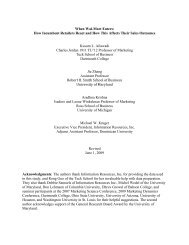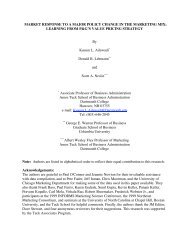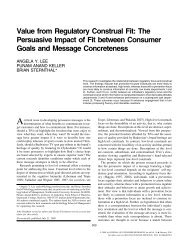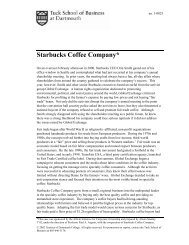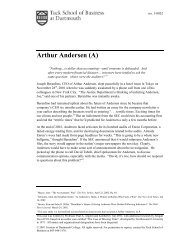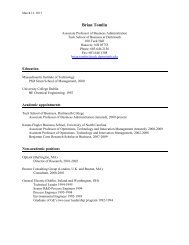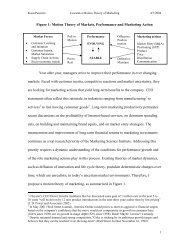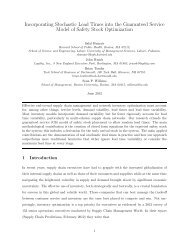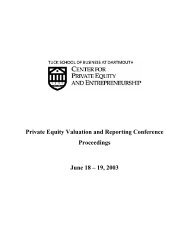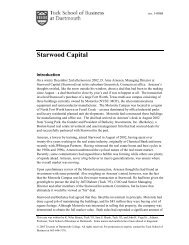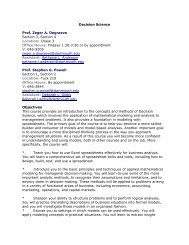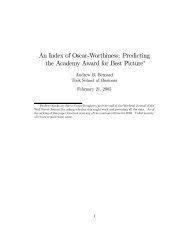tax notes international - Tuck School of Business - Dartmouth College
tax notes international - Tuck School of Business - Dartmouth College
tax notes international - Tuck School of Business - Dartmouth College
You also want an ePaper? Increase the reach of your titles
YUMPU automatically turns print PDFs into web optimized ePapers that Google loves.
SPECIAL REPORTS<br />
If the single <strong>tax</strong>payer approach is adopted, these<br />
eventual additional functions or risks <strong>of</strong> the enterprise<br />
in the host state will never be remunerated, which is<br />
clearly against the wording <strong>of</strong> article 7, and which is<br />
intended to provide for <strong>tax</strong> sharing between home and<br />
host states weighted on the basis <strong>of</strong> the functions performed,<br />
assets used, and risks assumed.<br />
This interpretation is shared by Richard Vann;<br />
though he believes that the existing theories regarding<br />
the allocation <strong>of</strong> pr<strong>of</strong>its to PEs are not convincing, he<br />
expresses his preference for what he called the ‘‘rowing<br />
or relay theory,’’ under which:<br />
every transaction within the boundaries <strong>of</strong> the<br />
firm is intended to produce a pr<strong>of</strong>it over and<br />
above the market price <strong>of</strong> any intra-firm transaction<br />
or dealing that operates as an input into that<br />
pr<strong>of</strong>it and that pr<strong>of</strong>it is allocated to all parts <strong>of</strong><br />
the firm which participate in the realisation <strong>of</strong><br />
the ultimate pr<strong>of</strong>it on the sale to the third party. 99<br />
The name <strong>of</strong> this theory refers to the idea that each<br />
member <strong>of</strong> the team contributes to the overall pr<strong>of</strong>it as<br />
they all work together towards the same goal, which<br />
resembles a rowing race.<br />
Therefore, it is clear that the authorized OECD approach<br />
is the only method that entails an adequate allocation<br />
<strong>of</strong> risks within the enterprise, avoiding an undue<br />
limitation <strong>of</strong> the host state <strong>tax</strong>ing rights. If the<br />
resulting increase in host state <strong>tax</strong>ation is undesirable,<br />
this is an issue <strong>of</strong> <strong>tax</strong> policy that does not overcome<br />
the conclusion that the authorized OECD approach<br />
provides for a proper allocation <strong>of</strong> risks within the enterprise,<br />
as opposed to its contrary single <strong>tax</strong>payer approach.<br />
B. The Rationale Behind Article 7<br />
In my view, it is undisputable that the rationale <strong>of</strong><br />
the OECD report is in line with the underlying principle<br />
codified in article 7.<br />
Article 7 upholds primacy <strong>of</strong> the arm’s-length principle<br />
in attributing pr<strong>of</strong>its to PEs as a natural consequence<br />
<strong>of</strong> the adoption <strong>of</strong> the separate entity fiction. 100<br />
The OECD report reaffirms the primacy <strong>of</strong> the<br />
arm’s-length principle in attributing pr<strong>of</strong>its to PEs by<br />
determining the adoption <strong>of</strong> the functionally separate<br />
entity approach. In the framework <strong>of</strong> an agency PE,<br />
the host state is therefore entitled to <strong>tax</strong> the pr<strong>of</strong>its that<br />
99<br />
Richard J. Vann, ‘‘Tax Treaties: The Secret Agent’s Secrets,’’<br />
Brit. Tax Rev. (50th Anniversary Edition), no. 3 (2006), p.<br />
345.<br />
100<br />
In 1933 the League <strong>of</strong> Nations draft already provided for<br />
the arm’s-length principle as the guidance for the allocation <strong>of</strong><br />
pr<strong>of</strong>its to intracompany dealings; see Russo, supra note 65, at 7.<br />
In this sense, the convention determined that a PE must be<br />
treated in the same manner as independent enterprises operating<br />
under the same or similar conditions.<br />
the agency PE might be expected to make if it were a<br />
separate enterprise engaged in the same or similar activities<br />
under the same or similar conditions and dealing<br />
wholly independently with the enterprise <strong>of</strong> which<br />
it is a PE.<br />
Some authors expressed concern about the requirement,<br />
under the authorized OECD approach, <strong>of</strong> the<br />
PE recognizing notional payments as a deduction or as<br />
basis for attributing pr<strong>of</strong>its, based on the notion that<br />
‘‘an enterprise cannot make a pr<strong>of</strong>it from dealing with<br />
itself.’’ 101<br />
However, by adopting the transfer pricing guidelines<br />
to a general enterprise and PE relationship, the only<br />
result that is harmonious is that the PE pr<strong>of</strong>its must be<br />
determined in accordance with the assets and risks <strong>of</strong><br />
the nonresident enterprise relating to the functions performed<br />
by the dependent agent on behalf <strong>of</strong> the nonresident<br />
enterprise, together with sufficient capital to<br />
support those assets and risks. As a matter <strong>of</strong> principle,<br />
the authorized OECD approach is the only one that<br />
leads to an outcome that is coherent with the fiction <strong>of</strong><br />
independence provided in article 7(2). It is undeniable<br />
that the single <strong>tax</strong>payer approach does not fully accomplish<br />
the fiction <strong>of</strong> independence <strong>of</strong> article 7(2), which<br />
is the same as saying that it results in a partial application<br />
<strong>of</strong> its provisions. This outcome cannot be accepted,<br />
as it is against the rationale and wording <strong>of</strong><br />
article 7.<br />
In this sense, as noted by Hans Pijl, the authorized<br />
OECD approach is correct from the perspective <strong>of</strong> <strong>tax</strong><br />
treaty interpretation because the result ‘‘coincides with<br />
the source principle ...that the state in which the activities<br />
are carried on has the right to levy <strong>tax</strong>.’’ 102<br />
Moreover, it is clear that, under the OECD report,<br />
there is no presumption that the agency PE will always<br />
generate pr<strong>of</strong>its. Sometimes little or no pr<strong>of</strong>it is attributable<br />
to it if only routine functions are performed. As<br />
the pr<strong>of</strong>its will be allocated among the relevant states<br />
in accordance with the functions performed and the<br />
risks assumed by the enterprise, each state will always<br />
be entitled to <strong>tax</strong> the pr<strong>of</strong>its that arise from activities<br />
carried out within its territory.<br />
Other criticism to the authorized OECD approach<br />
raised by Philip Baker and Richard Collier is that it<br />
‘‘represents a significant departure from the interpretation<br />
<strong>of</strong> article 7 as set out in the current commentary.’’<br />
103 In other words, they argue that the current<br />
wording <strong>of</strong> article 7 <strong>of</strong> the OECD model convention<br />
and its commentary does not leave room for the application<br />
<strong>of</strong> the authorized OECD approach and therefore<br />
amendments must be made at least in the commentary.<br />
Further, they conclude that considering the<br />
101 Baker and Collier, supra note 7, at 57.<br />
102 Pijl, supra note 9, at 32.<br />
103 Baker and Collier, supra note 7, at 31.<br />
442 • FEBRUARY 2, 2009 TAX NOTES INTERNATIONAL<br />
(C) Tax Analysts 2009. All rights reserved. Tax Analysts does not claim copyright in any public domain or third party content.



